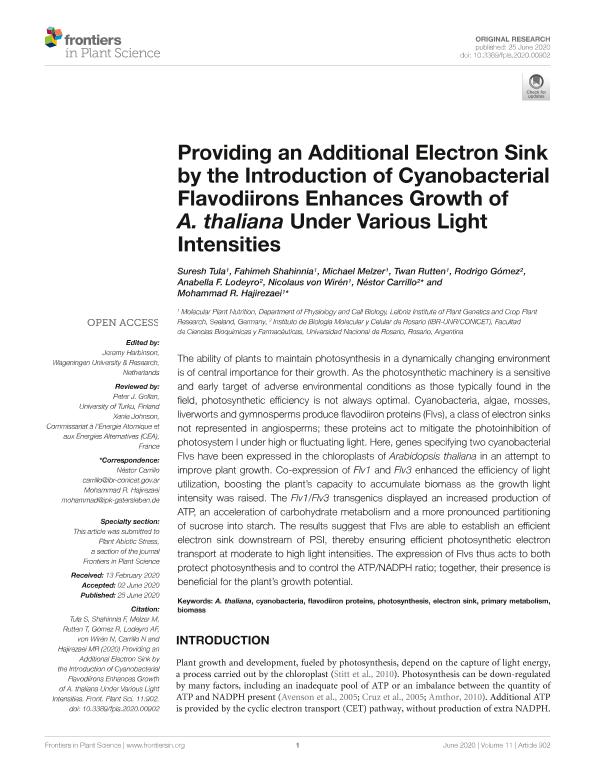Artículo
Providing an Additional Electron Sink by the Introduction of Cyanobacterial Flavodiirons Enhances Growth of A. thaliana Under Various Light Intensities
Tula, Suresh; Shahinnia, Fahimeh; Melzer, Michael; Rutten, Twan; Gómez, Rodrigo; Lodeyro, Anabella Fernanda ; von Wirén, Nicolaus; Carrillo, Nestor Jose
; von Wirén, Nicolaus; Carrillo, Nestor Jose ; Hajirezaei, Mohammad R.
; Hajirezaei, Mohammad R.
 ; von Wirén, Nicolaus; Carrillo, Nestor Jose
; von Wirén, Nicolaus; Carrillo, Nestor Jose ; Hajirezaei, Mohammad R.
; Hajirezaei, Mohammad R.
Fecha de publicación:
06/2020
Editorial:
Frontiers Media
Revista:
Frontiers in Plant Science
ISSN:
1664-462X
Idioma:
Inglés
Tipo de recurso:
Artículo publicado
Clasificación temática:
Resumen
The ability of plants to maintain photosynthesis in a dynamically changing environment is of central importance for their growth. As the photosynthetic machinery is a sensitive and early target of adverse environmental conditions as those typically found in the field, photosynthetic efficiency is not always optimal. Cyanobacteria, algae, mosses, liverworts and gymnosperms produce flavodiiron proteins (Flvs), a class of electron sinks not represented in angiosperms; these proteins act to mitigate the photoinhibition of photosystem I under high or fluctuating light. Here, genes specifying two cyanobacterial Flvs have been expressed in the chloroplasts of Arabidopsis thaliana in an attempt to improve plant growth. Co-expression of Flv1 and Flv3 enhanced the efficiency of light utilization, boosting the plant’s capacity to accumulate biomass as the growth light intensity was raised. The Flv1/Flv3 transgenics displayed an increased production of ATP, an acceleration of carbohydrate metabolism and a more pronounced partitioning of sucrose into starch. The results suggest that Flvs are able to establish an efficient electron sink downstream of PSI, thereby ensuring efficient photosynthetic electron transport at moderate to high light intensities. The expression of Flvs thus acts to both protect photosynthesis and to control the ATP/NADPH ratio; together, their presence is beneficial for the plant’s growth potential.
Archivos asociados
Licencia
Identificadores
Colecciones
Articulos(IBR)
Articulos de INST.DE BIOLOGIA MOLECULAR Y CELULAR DE ROSARIO
Articulos de INST.DE BIOLOGIA MOLECULAR Y CELULAR DE ROSARIO
Citación
Tula, Suresh; Shahinnia, Fahimeh; Melzer, Michael; Rutten, Twan; Gómez, Rodrigo; et al.; Providing an Additional Electron Sink by the Introduction of Cyanobacterial Flavodiirons Enhances Growth of A. thaliana Under Various Light Intensities; Frontiers Media; Frontiers in Plant Science; 11; 6-2020; 1-12
Compartir
Altmétricas



